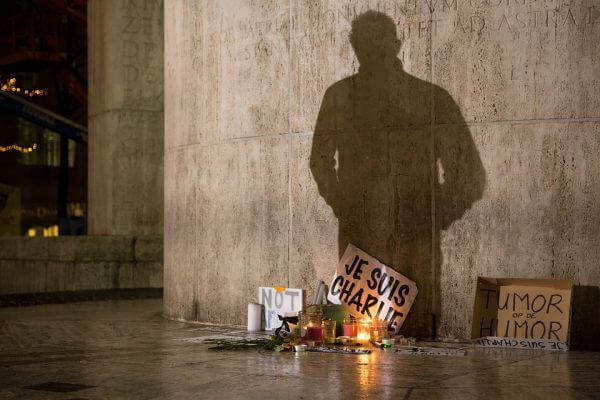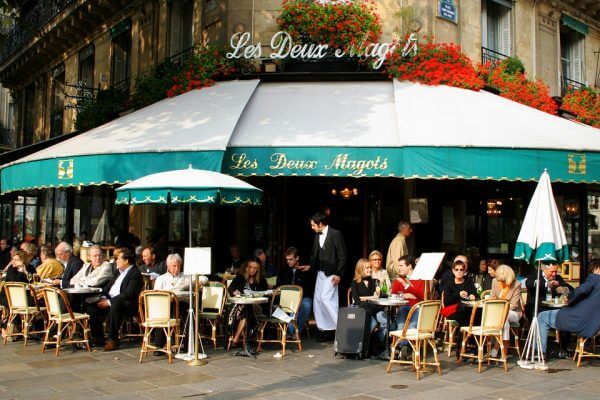
Paris a year on
This Sunday will mark one year from the terrorist attacks that killed 130 people and injured more than 350 in Paris in November 2015. Since then further attacks targeted Brussels, Nice and other localities in and outside Europe, forcing us to confront ourselves with the idea that violence can break into our everyday lives without warning. With the Bataclan, the music venue that was one of its main targets, reopening this Saturday with a Sting concert, Paris is getting ready to face the difficult anniversary of the onslaught. Here, three of its inhabitants tell us what living in the City of Light feels like a year on.
“I would like to sit with them and explain to them that life is beautiful”
Fawzy, 28, studied in Paris where he lived until September 2016
Compared to the divided reaction to the Charlie Hebdo carnage, everyone agreed that the Paris attacks were unfair and that it’s just a horror to kill innocent people. For a couple of days after the events we felt a sense of unity within the country as well as with other countries coming forward to show support. But soon everything changed: some people thought they didn’t need to question who carried out the attacks, for what reason and what we could do about what happened; the only important thing became knowing that it had been Muslims, a stance that was encouraged by the media. The number of documentaries about Islam, terrorism and so on that were released over the last year is incredible: for the media they are all the same subject, and this has a very negative impact. People believe in different religions and it’s wrong to stigmatise such a massive community and try to disrupt the feeling of union among French citizens just for political gain.

After the attacks the situation turned tense everywhere in Paris: I often witnessed people arguing in the street or the tube and if one of them was of Arab origins, you would always hear the phrase “You are a terrorist” used against them. One thing changed for sure: now for many people Muslim means terrorist, there is no more questioning whether one is radical or not.
When Syrian refugees came to France, some people started questioning what happened on the night of the attacks and suggested that politics may have a good share of the responsibility for it. When thinking about the attacks I think about the book “The Attack” by Abdellah Taia and the movie “God Horses” by Nabil Ayouch: I don’t have the energy to understand the psychology of terrorists as they did in these works, but I would like to sit with them and explain to them that life is beautiful and that the world is amazing… Now in Paris we have security officers everywhere to give people a sense of safety, but I don’t think we are safe, as the attacks in Nice demonstrated… and everyone is confused. As for me, I don’t care about politics or religion: I just hope that one day everyone will be able to live in a peaceful world and be happy.
“War knocks at your door and you can be killed”
Barbara, 34 years old, lives in the suburbs of Paris and works in a school
The attacks of November 13 dropped on me like an ice floe that made me shake for hours that night. I lived next door to the first bar that was assaulted – Le Carillon. At the very moment of the assault I was at home ready to go out. That night I struggled to keep my mind under control, I was afraid to go completely mad when I brutally realised that the shootings were the direct and historical result of a global phenomenon: war knocks at your door and you can be killed. I read compulsively in the aftermath of the attacks to understand what was happening on a broader geopolitical level. I had to deal with dark feelings and thoughts that were only amplified by the “state of emergency” declared by the government: I am still shocked to live in a country where the state of exception has been declared, where the suspension of “democratic” life has been normalised, where we witness a dramatic increase of islamophobia, a repressive political agenda, and the growing consent to far-right politics. Some words by Italian philosopher Giorgio Agamben got stuck in my mind, you can read them here: he basically argues that the state of emergency and exception is the most fertile ground for totalitarian regimes.

“People keep asking me what it’s like to live in France”
Anonymous, in their twenties, lives and works in Paris
On my way back home from work in the evenings, I sometimes get off at Place Albert Kahn, where the black Clio rented by Salah Abdeslam was found by the French police a year ago. The former petty criminal turned full-blown extremist had in fact mysteriously abandoned the mission he so carefully planned with the rest of the terrorist commando that struck Paris on November 13, 2015.
A year on, the commute in Paris is more often than not punctuated by suspicious packages, more and more rapidly dealt with by the transport police: as passengers, we all know that an absent-minded traveller must have forgotten their suitcase on their way home. Living in Paris feels bizarre – when I travel abroad for work, people keep asking me what it’s like to live in France: only after noticing the apprehensive looks on their faces I understand what they are referring to. I wonder how long after 9/11 New Yorkers stopped being asked what it was like to live in their city.
I feel proud of my country, and I tend to be overprotective of it when I am somewhere else. Yet the fear unclenched by the Paris attacks is very palpable; it translates into a sense of suspicion that lingers in the capital a year after this and after other attacks that struck close to Paris – those in Brussels and Nice in particular. Beefed up security, bag searches, ID checks, military patrols and false terror alarms are still very much part of the daily lives of the French.
For someone battling anxiety, a terrorist attack is virtually the worst that can happen. Mindfulness, positive thinking and management techniques appear as nothing more than temporary palliatives when the very real threat of gunfire and mass homicide is a few blocks away from the apartment where you choose to spend the evening instead of going out for a glass of wine. Even as someone who constantly looks over their shoulder, a year later this doesn’t feel like just a symptom of my own anxious mind, but something that seems to be more common than it ever was among other people too. The motto “Même pas peur” (“not even afraid”) does not apply to me; I love Paris — but I don’t love the jittery feeling I get at the slightest sign of disorder in the métro, when I go to the theatre, or to a gig. A year on, the terrorists have still ruined it for me.
Cover photo by Unsplash / Pixabay
attentato1, Bataclan, featured, France, ISIS, paris, Terrorism